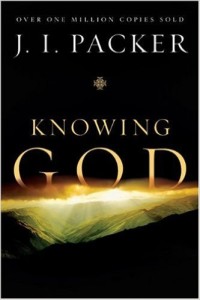I’ve been reading Knowing God, by J.I. Packer – for the third time. It’s that good.
There is so much truth in the first few chapters, it’s hard to know where to begin.
These statements stand out from chapter two:
“One can know a great deal about God without much knowledge of Him.”
“Knowledge about God, and the capacity to think clearly and talk well on Christian themes, is not at all the same thing as knowing Him.”
“We may know as much about God as Calvin knew . . . and yet all the time (unlike Calvin, may I say) we may hardly know God at all.”
This simple distinction between knowing about God and knowing God is huge. I can accumulate much knowledge about God and yet never really know God.
Packer paints this incriminating picture:
“We find in ourselves a deep interest in theology. We read books of theological exposition and apologetics. We dip into Christian history, and study the Christian creed. We learn to find our way around in the Scriptures. Others appreciate our interest in these things, and we find ourselves asked to give our opinion in public on this or that Christian question, to lead study groups, to give papers, to write articles, and generally to accept responsibility, informal if not formal, for acting as teachers and arbiters of orthodoxy in our own Christian circles. Our friends tell us how much they value our contribution, and this spurs us to further exploration of God’s truth, so that we may be equal to the demands made upon us.”
I apply this to Bible study, for that is the most common way that I acquire knowledge about God. We can pour ourselves into reading the Word and doing any number of other things to gain a thorough understanding of Scripture. Resources abound: commentaries, Bible study guides, websites, sermons. Are we not blessed to have so much Bible information at our disposal? Has any generation had more knowledge about the Bible at its fingertips?
I can study the Bible on my own. Or I can attend any number of institutions of higher education and earn degrees in theology. I can go online and listen to godly men expound every verse from Genesis to Revelation. And I can do this for years and never know God.
This is scary. And it should be. Packer has cut to the chase right out of the gate by focusing on our motive for Bible study.
Why do I read and study the Bible?
That is the question I am asking myself. What is the purpose of opening The Book and striving to understand it? To know about God, or to know God? This is the difference between life and death, heaven and hell.
My response to this teaching is repentance. I realize that I have often studied the Bible for self-glorifying purposes – namely, to be recognized by peers as one who “knows the Word.”
“Oh God, please forgive me for this prideful motive, and please give me the pure motive of studying the Word in order to know you.”
NOTE: This is the first in a serious of posts on Knowing God by J.I. Packer. To read the other posts in this series, click here.
- 7 Bible Verses about God’s Love - March 14, 2025
- Would A Loving God Send Anyone to Hell? - March 5, 2025
- The Whole Bible in Four Words - February 26, 2025

